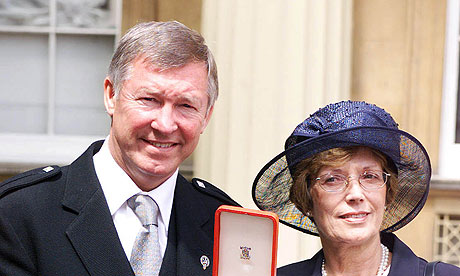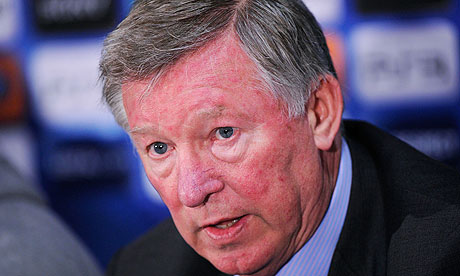Lady Cathy Ferguson may not know as much about football as her illustrious husband, yet she appears to have a better understanding of what is permissible on the pitch.
The Manchester United manager has revealed that his wife's first reaction, on his return home from the eventful game at West Ham last Saturday, was to inform him that Wayne Rooney was likely to be banned. "She just said: 'They'll do him'," Sir Alex Ferguson said. "I told her they couldn't possibly do him for celebrating, but it turns out she was right."
That is because Mrs Ferguson had been following events on television, rather than being caught up in them at Upton Park. She knew precisely how ugly and unacceptable Rooney's behaviour had looked, because it came straight through the camera lens and into her living room. Others within Manchester United must have reached the same conclusion fairly quickly, because an apology was formulated within hours with a view to damage limitation. This was not just a case of Rooney using industrial language on the pitch, as he has done countless times before.
Mrs Ferguson appreciated that straight away, which is more than can be said for many of the player's defenders. This was not even a case of Rooney moaning swearily at a nearby cameraman as he had done after a disappointing result with England in South Africa. On that occasion Rooney was expressing his disappointment at being booed by his own team's supporters, and whether you agreed with him or not he was entitled to express his point of view. While there are certainly better times and places for communicating with your public than in the immediate aftermath of a poor performance, there would have been no real justification for disciplining Rooney for speaking his mind in Cape Town. If the nation was affronted it was with the football he had produced, not with the reaction afterwards.
One can hardly expect Ferguson to condemn his own player when the FA has already done so, yet if the United manager really thought Rooney was merely "celebrating" then he needs to sit down in front of some uncensored TV footage. If that is how Rooney celebrates, goodness knows what sort of trouble he will get into should he ever become upset about something. The issue the authorities had to deal with was one of a player spotting a TV camera, possibly one that had strayed too close or one whose operator was attempting to choreograph some formulaic celebration, and reacting with visceral displeasure. Never mind for now the argument that players ought to get into as much trouble for verbally abusing a referee as a camera, and ignore for the moment attention-seeking police officers claiming without much corroboration that they lock people up for effing and jeffing in the street. Both those considerations rather miss the point in this case, which is that the camera is not an inanimate object but a direct conduit to the millions of viewers in hundreds of countries that make the Premier League all its money.
Rooney is smart enough to realise that, and for all his talk of being gutted he seems to have been not far behind Mrs Ferguson in working out you cannot get away with insulting the audience, but in the few seconds that mattered at West Ham he found himself in insufficient control of his temper and his emotions.
While the FA are well aware they would have been damned for doing nothing, just as they are being criticised now for being arbitrary and inconsistent, it could usefully take this opportunity to clarify their position and make sure players understand the ground rules in future. They could start by refuting Rooney's disingenuous whinge that he cannot be the first footballer to be caught swearing on TV.
The interface between pitchside camera and player is a relatively new one, certainly in terms of the number of cameras in use and their increasing proximity to protagonists. The fact that such cameras catch players swearing at each other and at the referee is neither here nor there; that sort of thing has been going on since Match of the Day was first broadcast in grainy black and white. Footballers' vocabulary is emphatically not what this fuss has all been about.
The FA simply need to make it clear that they have drawn a distinction between the background noise of a game and what is said, or shouted, directly and purposely to camera. Maybe the cameras ought to back off, though it would be better if players simply behaved themselves. It ought not to be too much to ask, even for a troubled soul such as Rooney, described by his official biographer as a polite, respectful, well-brought-up young man. Hunter Davies was comparing him with another of his subjects, the unrepentantly oafish and free-swearing Paul Gascoigne. If the two most notable English players of the past two decades seemed to be on completely divergent paths just a couple of years ago, they have a little more in common now, namely a capacity for self-destruction.
It is too indulgent to excuse Rooney's behaviour on the grounds that his anger is what make him a great footballer. He has always been a great footballer, even when he used to celebrate goals with a cheeky grin. Whatever is going on in his life at the moment is not feeding his football, it is eating away at him.

